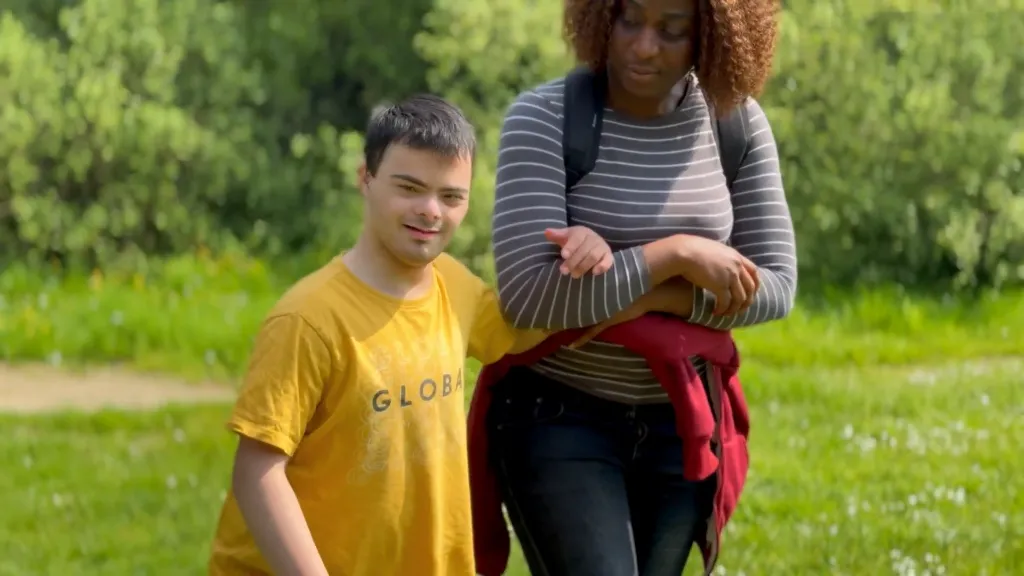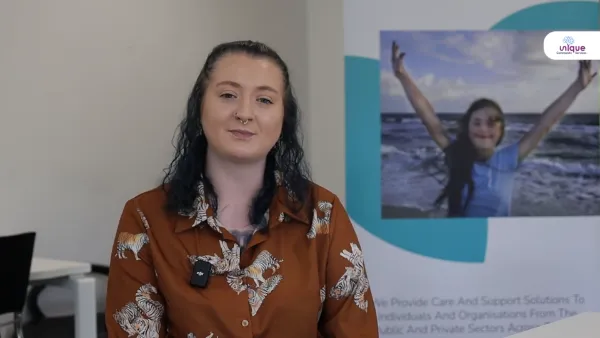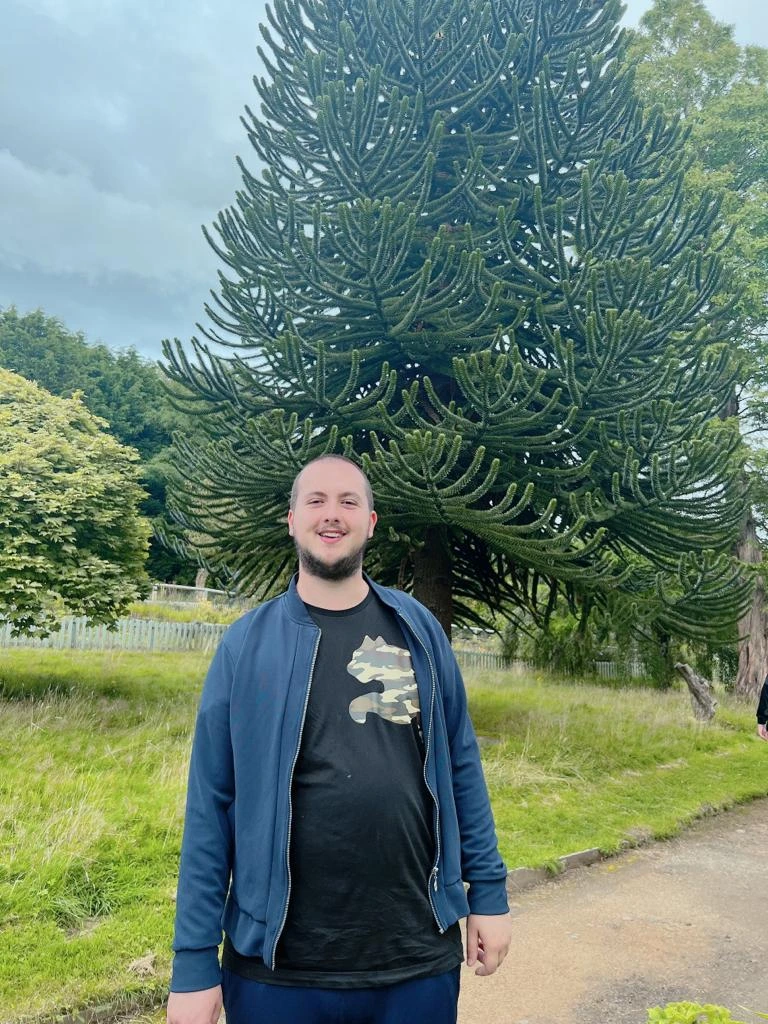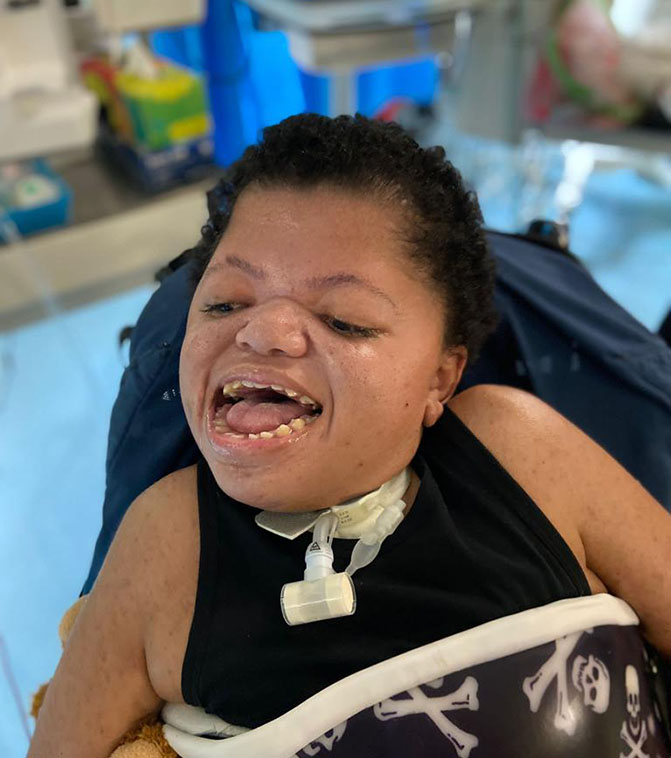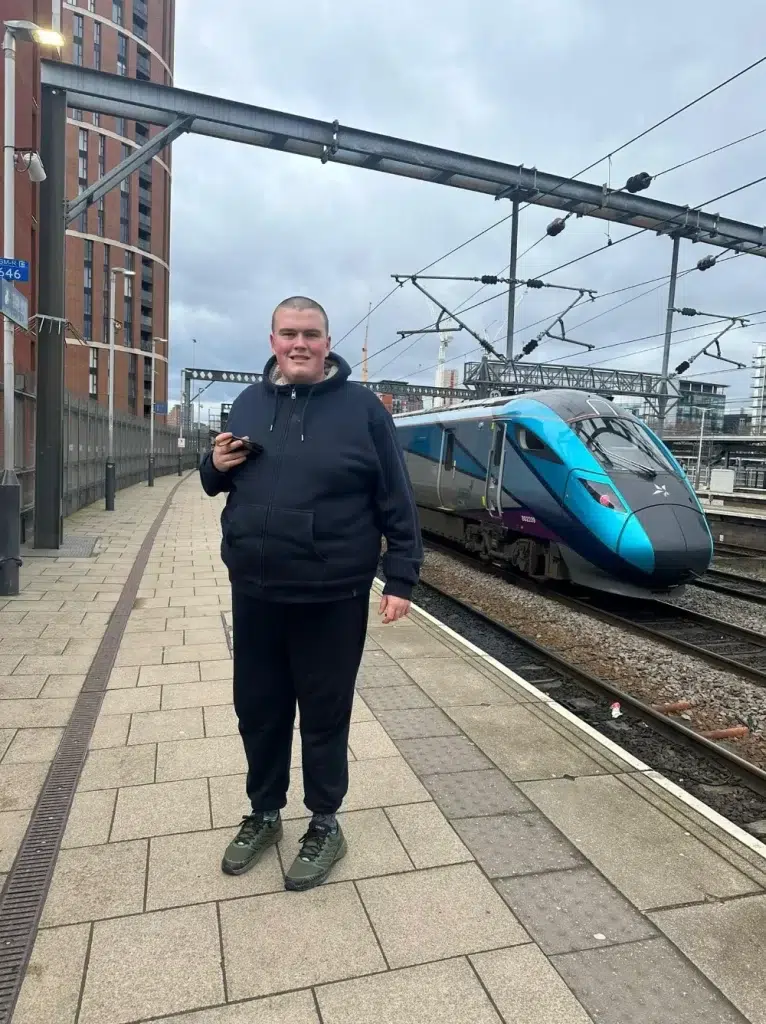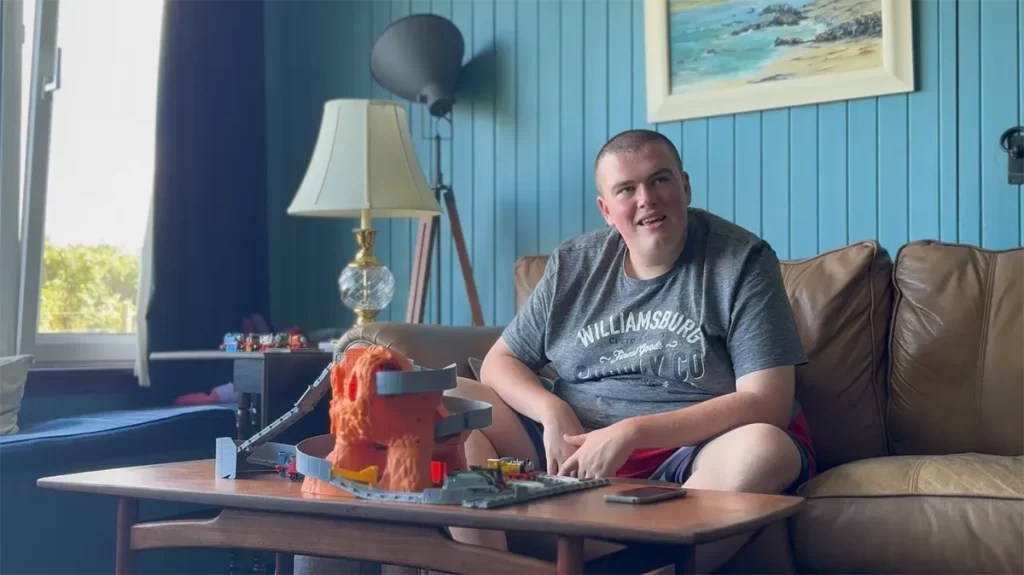“He phones me every night now. Just to say goodnight.” – Christine, Elliot’s mother

When we begin to see people not merely through the lens of behaviours, incidents, or risks, but as a whole person, a subtle yet profound shift takes place. Elliot’s story is a reminder of this change in perspective. It encourages us to reflect on what truly matters in care, what we celebrate as progress, and most importantly, how we see the people we support.
Meet Elliot
Elliot is creative and curious, and has an absolute love for trains and lorries. Trips to the Lake District are something he really enjoys, along with the daily drives in the car.
“I also like going to the park, beach, farms, trampoline parks, and walking in the woodland. Eating out is always a treat. In between all these activities, I make sure to take time to relax.“ – says Elliot.
For years, these passions were overshadowed by systems that failed to see his real needs and aspirations. Elliot is autistic, has epilepsy and a moderate learning disability.
We asked his mother, Christine, what the most important things are to him.
Her answer:
“Family and home are really important to Elliot. He likes having a routine and knowing the plan for the day, and relies on times, dates, and his calendar to keep everything organised. Consistency in Elliot’s support is important too, and makes him feel comfortable when he knows the boundaries that are in place.“ – Christine, Elliot’s mother.
When Systems Create Silence
Before his transition to new support with Unique Community Services, Elliot had been institutionalised, staying in a hospital for four and a half years (4.5), going through a really hard time. The more rules and restrictions that were put in place, the more distressed he became.
‘’When a loved one gets sectioned under the Mental Health Act , even though they are the ones in the hospital, I felt like I was also doing a life sentence alongside him.’’ – Rebecca Davis, Elliot’s Sister.

He couldn’t ride public transport.
He had to walk miles just to visit his mother.
Even his kitchen cupboards were locked.
The more restrictions piled on, the more behaviours escalated. His family, exhausted and unheard, were told that he couldn’t come home, and they couldn’t cope. But they never stopped advocating for him. His mother, Christine, and sister, Rebecca, pushed for something better.
“The transition was successful because we were able to all come together and plan it together. It was really, really important that we made a commitment, and it wasn’t just about developing a support plan; we needed to be in there finding out what needed to happen, and Elliot needed to be at the central of that. We made a significant commitment to be in there, and we were there pretty much on a daily basis, one or the other of us. To this day, we still remain there. Two or three times a week. It enables us to build trust, it enables us to provide real-time support so that issues we could discuss together weren’t just coming from a management input. The decision is made together, and Elliot is involved in that decision-making.“ – Carol Taylor, Registered Manager at Unique Community Services.
Support That Walks Beside Elliot
July, 2024. Our care teams started planning the transition straight away and reviewed his care plan.
Our therapy team collaborated with Elliot’s family, his previous provider and clinicians, key stakeholders, and most importantly, Elliot himself, to ensure a smooth and positive transition for both Elliot and his support team.
Creating the right support for Elliot included:
- Using the Core Principles of Positive Behaviour Support (PBS), proactive and active support
- Reviewing Elliot’s PBS plan with all stakeholders
- Welcoming and introducing the team to him and his family
- Forming a person-centred support
- Actively working towards reducing restrictions and promoting positive risk-taking
- Continuous embedding of positive practice and routines, open communication around where changes can be made
- Developing a Bespoke PROACT-SCIP training specifically for Elliot
“It wasn’t just about supporting Elliot but also supporting his family. We built trust, reviewed Elliot’s current PBS plan with all stakeholders, including his family, and provided additional PBS training to support the team in developing a tailored PBS approach and PROACT-SCIP for Elliot. We conducted a restricted practice audit. There were a number of significant formal restrictions for Elliot, but also some informal restrictions due to current practices. We needed to look at these in depth and see where we could reduce those restrictions as much as we could. We completed a training needs analysis for PROACT-SCIP sessions, ensuring ongoing support followed a clear, PBS and person-centred pathway.” – Darren Moyle, PBS Practitioner.

The Positive Outcomes
It was really important for the team to let their support revolve around Elliot and make decisions with him. The message was there: We trust you. You matter. This is your life.
Elliot today lives in his own bungalow, and his life now mirrors the life he wants. The staff follow his lead and support his passions.
Take a glimpse into Elliot’s world:
- Elliot now decides how he spends his days.
- He enjoys time in his community, especially exploring buildings and nature.
- His behaviour is calmer. His sleep is better.
- He listens to music in his favourite café.
- He chats more. He laughs more.
- Use of restrictive practices and PRN medication has drastically reduced.
- Communication has improved between Elliot, his family, and his team.
He’s even started creating art again, for the first time in eight years.
“He gets up when he wants to get up. It could be 12 o’clock in the afternoon, or it could be 9 o’clock in the morning. He’s got all his team there to greet him, has his breakfast, has his morning routines, bathes, gets ready, and then he just says to his team: Can we go here, can we go there? Elliot makes his own plans of what he wants to do on that day, and the staff facilitates it. So, he loves buildings, so nearly every day now he goes to a favourite building in Leeds. He’s now ordering his own hot chocolate, paying for it, waiting for it to be prepared and then sits at the table. The Starbucks staff absolutely love him. He’s got his own sofa in there and he can spend from three hours a day to about six hours a day chilling, listening to his music.’’ – Christine, Elliot’s Mother.
It’s what happens when we get the fundamentals right: trust, choice, compassion, and presence.
This Is What Happens When We Believe in People
Elliot’s next adventure? A holiday.
He hasn’t been on one in nearly a decade, but this year, he will.
Camping with his family. Walking in nature. Living fully.
He’s making plans to visit London too.
“We just wanted Elliot to be seen for the person and the lovely young man that he can be, for his needs to be met, no restrictions were placed on him. Yeah, and to live his life, a good quality of life, rather than not what he had previously. And for him to be understood.’’ – Christine, Elliot’s Mother
With the right support, people can live a life that it’s their fundamental human right. And yes, people can flourish. Not because we remove all challenges, but because we walk alongside them.
“Elliot doesn’t ask for the impossible. He just wants to live his life. And our role is to make that possible — not with control, but with curiosity and care.” – Darren Moyle, PBS Practitioner.
We encourage families and health professionals to know the Acts (laws) so they can protect the rights of their loved ones/supported people, make informed decisions about the right support, and receive fair treatment. That is why we created short, yet concise overviews of the Acts, including the Mental Health Act.
Download the Legislation Overview.


